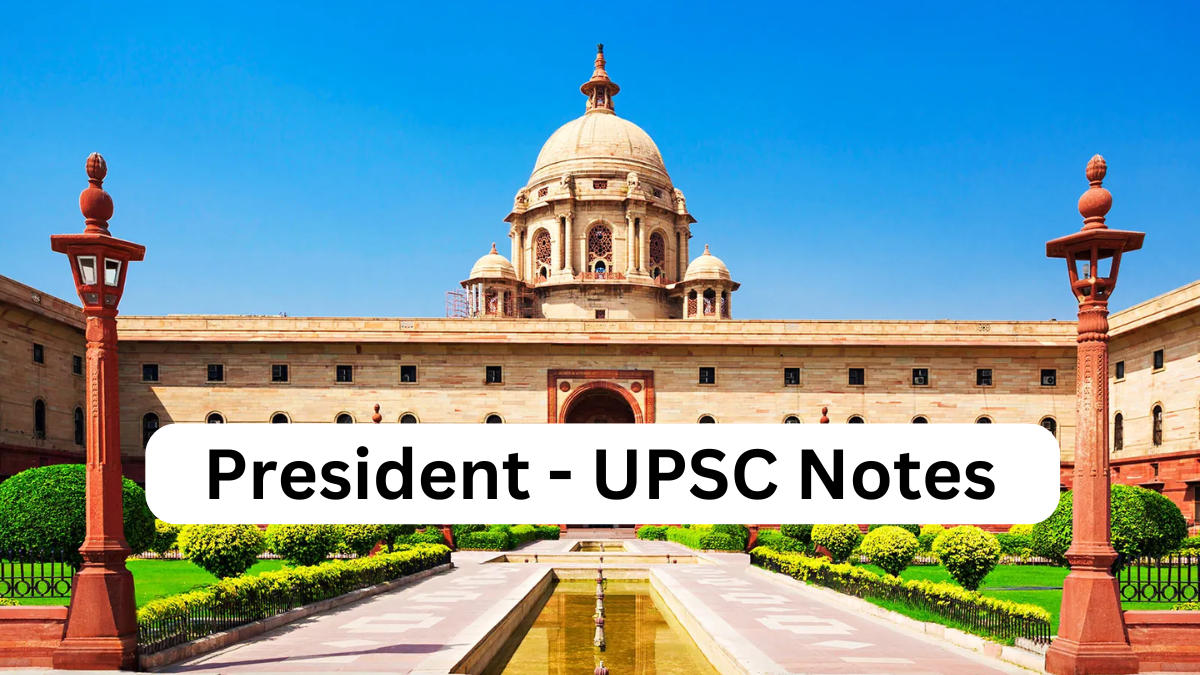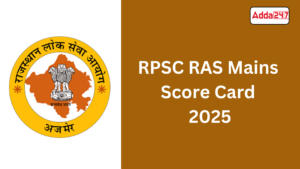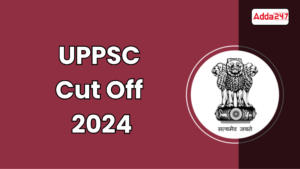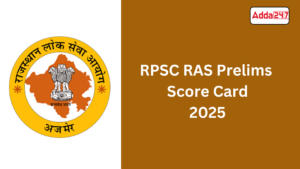Table of Contents
Indian Polity is an important part of the preparation for the UPSC Civil Service Exam. It is also most lengthiest subject to be covered by the aspirants during the course of preparation but still, the returns from preparing the Indian Polity rock solid are worth it as majorly the prelims exam contains questions from this segment in comparison to any other segment.
President of India – UPSC Notes for Prelims and Mains
In this article, we have comprehended the election of President, qualification and oath, term and impeachment, powers of the President of India, to cater the needs of candidates with reference to Indian Polity UPSC Notes for President. There is a high chance of a question being framed from this topic in the prelims paper and the mains paper.
we have attached the previous year question co relating with the President of India, to help the aspirant making their preparation rock solid along with the PYQs you can also find President UPSC Notes PDF in this article.
President of India
The President of India is the nominal head of the state of India.
- The President of India is also considered as the first citizen of the Indian State.
- President of India is part of Union Executive along with the Vice-President, Prime Minister, Council of Ministers, and Attorney-General of India.
- Part V of the Constitution of India from Article 52 to Article 78 deals with the Union Executive under which also comes President of India.
- Article 52 of the Constitution of India states that ‘there shall be a President of India’.
What are the Qualification of The President ?
A person to be eligible for the candidature for elections as President should fulfil the following qualifications:
- He should be a citizen of India.
- He should have completed 35 years of age.
- He should be qualified for election as a member of the Lok Sabha.
- He should not hold any office of profit under the Union government or any state government or any local authority or any other public
- The nomination of the candidate for election needs to be subscribed by at least 50 electors as proposers and 50 electors as seconders.
- A security of Rs 15,000 is to be deposited by each candidate in the Reserve Bank of India.
Elections Of The President in India
The President is elected not directly by the people but by members of electoral college which consists of :
- elected members of both the Houses of Parliament
- the elected members of the legislative assemblies of the states
- the elected members of the legislative assemblies of UT (Delhi and Puducherry)
- Where an assembly is dissolved, the members are cease to be qualified to vote in presidential election, which means the individuals who were members of that assembly lose their eligibility or right to participate in the election of the president.
- To establish fair and equal representation of all states the constitution has given value to each vote of MLAs and MPs which can be calculated as mentioned below;
Value of the Vote of an MLA = (Total Population of State/total no. of elected members in assembly) x (1/100)
Value of the vote of an MP = (Total value of votes of all MLAs of all states)/(Total number of elected members of Parliament)
- In order to win the election of president the candidate must secure a fixed quota of votes which can be calculated
Electoral Quota = [(Total number of Valid Votes)/ (Number of candidates)] + 1
- Each member from the electoral college is given one ballot paper, the voter has to cast his preference marking 1,2,3,4 against the name of candidate.
- If the candidate secures the required quota in 1st phase of voting then he is declared the President otherwise the process of transfer of votes is initiated.
- In this process ballots of candidate securing the least 1st preference vote are cancelled and his 2nd preference votes are transferred to other candidates.
- This process continues till any of the candidate secures the required quota.
- Any dispute with the elections of the President is to be decided by the supreme court, whose decision is final.
Oath by The President
Before entering and taking up the office, the President has to make and subscribe to an oath or affirmation. In his oath, the President swears:
- to faithfully execute the office
- to preserve, protect and defend the Constitution and the law; and
- to devote himself to the service and well-being of the people of India.
- The oath is administered by the Chief Justice of India.
- In absence of Chief Justice of India, the senior most judge of the Supreme Court does this task.
Conditions of The President Office
The Constitution lays down the following conditions of the President’s office:
- He should not be a member of either House of Parliament or a House of the state legislature. If any such person is elected as President, he is deemed to have vacated his seat in that House on the date on which he enters upon his office as President.
- He should not hold any other office of profit.
What Perks are provided to The President ?
Perks provided to the president by the constitution are:
- He is entitled, without payment of rent, to the use of his official residence (the Rastrapati Bhavan).
- He is entitled to allowances and privileges as may be determined by Parliament.
- His emoluments and allowances cannot be diminished during his term of office.
- In 2008 parliament increased the salary of The President to 1.5lakh per month from 50 Thousand per moth and pension to 50% of his salary.
- President enjoys legal immunity from legal liabilities for his official acts.
- However after giving 2 month notice Civil proceedings can be initiated against him.
What is the Term of The President’s Office ?
Terms of the office of the President :
- The President holds the office for a term of 5 years.
- He can resign any time by submitting his resignation to the Vice-President of India.
- He can hold office beyond 5 years if the successor has not been elected till then.
- He can be elected multiple times.
- Also he can be removed by following the impeachment process, discussed below.
CLICK HERE TO DOWNLOAD PRESIDENT UPSC NOTES PDF
Impeachment Process of The President in India
The impeachment process is serious and complex it is based on ‘violation of the constitution’ by the President, though this has not been mentioned in the constitution.
- Initiation – Either of the house can initiate the process of impeachment, but the charges must be signed by at least 1/4th of the total members of that house.
- Notice – A 14 day notice to be given before presenting the resolution.
- Resolution – Firstly the resolution must be passed by the 2/3rd majority of total membership of the house where it was introduced and then after the investigation by the committee from the second house the resolution is presented in the second house, If second house also passes the resolution with the 2/3rd majority, The President is removed from the office.
- Removal comes in effect from the date when the resolution was passed.
Arrangements in case of Vacancy in President Office?
The vacancy may occur in the President office in case of expiry of tenure, resignation, removal or impeachment, death or any other case, here will discuss about these scenarios
- Expiry of Term – When the 5 year term is about to and elections are delayed then the ongoing president continues as the president.
- Resignation, removal, death or disqualification – If the reason of vacancy is among these then the new president takes the charge until then interim arrangements are made.
- Interim arrangements – Vice President acts as president during any of such events.
- If both the offices of President and Vice President is vacant then the CJI or senior most judge of supreme court act as president.
What are Powers of The President ?
The powers of the president can be categorized as –
- Executive powers
- Legislative powers
- Financial powers
- Judicial powers
- Diplomatic powers
- Military powers
- Emergency powers
We have further explained each of these in detail
Executive Powers of The President
The President appoints the Prime Minister and other ministers, who serve at his pleasure. He also appoints heads of constitutional bodies and can seek information on the administration of the union.
- All executive actions are taken in his name.
- The President appoints Prime minister and other ministers, who serves at the President’s pleasure.
- The president appoints the head of various constitutional bodies like:
- Along, with the head of constitutional bodies he can also appoint head of various non constitutional bodies like:
- He can seek information regarding administrations of union.
- The President can appoint commissions.
- He is administrates UTs through administrators appointed by him
- He has the power to declare any area scheduled area.
Legislative Powers of President
The President of India is entrusted with the responsibility to summons or prorogues Parliament and dissolve the Lok Sabha.
- President can summon a joint sitting of Lok Sabha and Rajya Sabha in case of deadlock.
- President also addresses the Indian Parliament at the commencement of the first session after every general election and first session of each year.
- Appointments: The President of India appoints-
- Speaker and Deputy speaker of Lok Sabha, and
- Chairman/Deputy chairman of Rajya Sabha
- Nomination Powers :
- Rajya Sabha: He nominates 12 members of the Rajya Sabha
- Lok Sabha: He can nominate two members to the Lok Sabha from the Anglo-Indian Community
- Disqualifications of MPs: President consults the Election Commission of India on questions of disqualifications of MPs when needed.
- Prior Approvals to Certain Bills: He recommends/ permits the introduction of certain types of bills like-
- Money Bills
- Creation/Alteration of Boundary of a state
- Certain types of Financial Bill
- Ordinance Making Power: He has powers to promulgate ordinances when one or both houses of the Parliament is not in session.
- Laying Reports in Parliament: President of India also lay down certain reports before the Parliament. These are the reports of-
- Comptroller and Auditor General
- Union Public Service Commission
- Finance Commission, etc.
- If a bill is passed by the state legislature and reserved by the Governor for consideration of the president, he can
- Give assent to bill
- withhold his assent to bill
- direct the governor to return the bill.
- When a bill is sent to the the President after being passed by the parliament president can;
- give assent to bill
- withhold his assent to bill
- return the bill for reconsideration.
If the bill is again passed by the parliament without any amendments, the president has to give his assent.
Financial Powers of The President
President holds financial powers in the following domains:
- Money Bills: Prior recommendation of the president is required to introduce the money bill in the Lok Sabha.
- Introduction of Annual Budgets: He causes Union Budget to be laid before the Parliament
- Administration of Contingency Fund of India: Contingency Fund of India is administered under the overall control of the President of India.
- Finance Commission: He constitutes the finance commission after every 5 years.
Judicial Powers of The President
The following are Judicial powers of the president –
- Chief Justice of India, Judges of Supreme Court and high court are appointed by him.
- Pardoning power: Under article 72, he has been conferred with power to grant pardon against punishment for an offence against union law, punishment by a martial court, or death sentence.
- The President shall have the power to grant pardons, reprieves, respites or remissions of punishment or to suspend, remit or commute the sentence of any persons convicted of any offence –
- In all cases where the punishment of sentence is by a Court Martial;
- In all cases where the punishment or sentence is for an offence against any law relating to a matter to which the executive power of the Union extends;
- In all cases where the sentence is a sentence of death.
Diplomatic Powers of The President
As the nominal head, president enjoys the diplomatic powers.
- International Treaties and agreements that are committed are negotiated and concluded in the name of the President of India.
- He is the representative of India in international forums and affairs.
- He is entitled to send and receive ambassadors and high commissioners.
Military Powers of The President
The President of India is the commander of the Defence forces of India. He is entrusted with the appointment of-
- Chief of the Army
- Chief of the Navy
- Chief of the Air Force
- Chief of Defense Staff
- He can declare war and conclude peace, subject to approval of the parliament.
Emergency Powers of The President
President of India withholds the power to invoke the emergencies mentioned in the constitution;
- National Emergency (Article 352) on grounds of war and external aggression.
- President’s Rule (Article 356 & 365) on grounds of disturbance in states.
- Financial Emergency (Article 360) on grounds of threat to financial stability.
What is Veto Power of The President ?
The Veto power of the president can be categorized as:
- Absolute veto
- Suspensive veto
- Pocket veto
- Qualified veto (not possessed by the Indian President)
- Above, under the heading of legislative powers of president of India we studied that the president has 3 alternatives when a bill passed by parliament is brought to him for his assent but when the bill again reaches him for the assent he can’t use any of the 3 alternatives
- There comes the role of veto power with this he can withhold his assent to the bill when it reaches him for first.
- This provision provides –
- prevention of hasty and ill-considered legislation by parliament.
- prevention of legislation which may be unconstitutional.
Absolute Veto
It is associated with the power of the president to withhold his assent to bill passed by the parliament, the bill is then put to an end and does not becomes a law.
- It is exercised in situations like –
- With respect to private member bill
- government bills when cabinet resigns and the ew ministers suggest to not give assent.
Suspensive Veto
The President can return a bill for reconsideration by Parliament. However, if Parliament passes the bill again, the President must give assent.
- This veto does not apply to money bills.
- Money bills get assent from the president as they are introduced after permission from the president.
Pocket Veto
- In this case the president does not ratifies, nor rejects nor returns the bill but keeps the bill pending for an infinite period of time.
- This power of president to not take any action is called pocket veto.
No veto is exercised by the president in terms of Constitutional Amendment act, the 24th Constitutional Amendment Act of 1971 made it obligatory for president to give his assent to constitutional amendment act.
Can President Veto for State Legislature ?
Here we have discussed about the veto power of president with reference to the state legislature.
- A bill passed by state legislature requires assent from the governor.
- Governor has 4 options;
- assent the bill.
- withhold the bill
- return the bill for reconsideration.
- reserve the bill for consideration of the president
- Above we have discussed the options with president in case such a bill is presented to him, if the state legislature again passes the bill without any amendments and the bill reaches the president again, the president is not bound to give his assent.
- This means that he can exercise Pocket Veto in any case of state legislature also.
Ordinance Powers of The President (Explained)
Article 123 of the Constitution empowers the president to notify the ordinance during the recess of parliament.
- Ordinance has same effect as the law by the parliament.
- Conditions to promulgate Ordinance –
- Both houses of the parliament should not be in session or either of the house is not in session.
- It should be satisfactory to the president that the conditions are necessary to take immediate action.
- An ordinance can be only issued on the matters, on which parliament can make laws
- An ordinance is subject to same limitation as a law, for example it can not take away fundamental rights.
- The ordinance must be laid before both the houses after they reassemble and be approved within 6 weeks, otherwise it stands to be ceased, may cease before 6 weeks if the parliament disapproves it.
- An ordinance can be retrospective in nature.
- The president can also withdraw at any time.
Pardoning Power of The President in Detail
Pardoning powers of the President are independent of the judiciary.
- The pardoning powers of the president includes :
- Pardon – Pardon allows removal of both sentence and conviction completely absolves the convict.
- Commutation – It allows substitution of lighter form of punishment. for example death sentence might be commuted to imprisonment
- Remission – It implies reducing the period of sentence without changing character.
- Respite – It involves giving slight less sentence in place of original one because of special circumstances.
- Reprieve – It is used to put a stay on the sentence for a period of time, it is purposed to provide the convict time to seek commutation from the president.
- Pardoning powers of the president is not subjected to the judicial review, except for cases where the decision irrational.
- President is not bound to give reasons for his decision.
- The power is exercised with the advice from the union cabinet.
- President can have different view from what the court has.
- If a petition is rejected by the president, stay can not be obtained by filing other petition.
UPSC Mains PYQ for President of India
Now that you have gone through the President UPSC notes, candidates must be in a position to answer these question, attempt these to check your knowledge and refer again to the above President Notes for UPSC if you find any difficulty.
Q1. Comment on the nature of the Ordinance-making power of the President of India. What safeguards are there against possible misuse? (150 words) (2001, 15 Marks)
Q2. What is the composition of the Electoral College for the election of the President of the Indian Republic? How is the value of votes cast counted? (250 words) (2002, 30 marks)
Q3. Discuss the question of the death sentence and Presidential clemency. (250 words) (2003, 30 Marks)
Q4. What are the exceptions when the President of India is not bound by the aid and advice of the Council of Ministers? (150 words) (2007, 15 Marks)
Q5. Instances of the President’s delay in commuting death sentences have come under public debate as a denial of justice. Should there be a time limit specified for the President to accept/reject such petitions? Analyze. ( 2014, 12 Marks)
Q6. Critically examine the procedures through which the Presidents of India and France are elected. (250 words) (2022, 15 Marks)
| ALSO READ | |
| UPSC Indian Polity Notes | UPSC Indian History Notes |
| Check UPSC Indian Geography Notes | Judicial Reforms |
| Constitutional Morality | Devolution of Power and Finance |
| Making of the Constitution | |



 RPSC RAS Mains Score Card 2025 Out, Chec...
RPSC RAS Mains Score Card 2025 Out, Chec...
 UPPSC Cut Off 2024, Expected and Previou...
UPPSC Cut Off 2024, Expected and Previou...
 RPSC RAS Prelims Score Card 2025 Out, Ch...
RPSC RAS Prelims Score Card 2025 Out, Ch...
